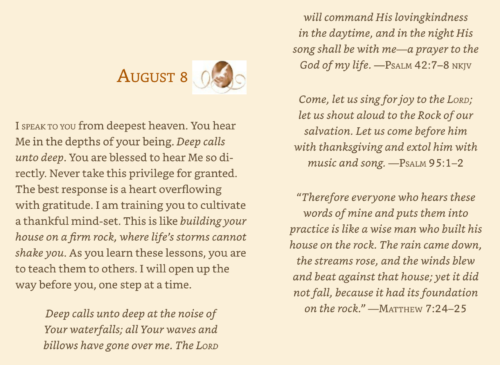Knowing with Our Whole Being
Father Richard Rohr affirms that true “knowing” occurs within our bodies, not just our minds:
Deep knowing and presence do not happen with our thinking minds. To truly know something, our whole being must be open, awake, and present. We intuitively knew how to be present as babies. The psychologist D. W. Winnicott (1896–1971) once said “There is no such thing as a baby.” [1] There’s only an infant/caregiver. In the first several months, from the infant’s perspective, they are one and the same. Infants see themselves entirely mirrored in their family’s eyes; they soon believe and become this vision. Contemplative prayer offers a similar mirroring as we receive and return the divine gaze.
In his book Coming to Our Senses, historian Morris Berman makes the point that our first experience of being alive is not through the visual or auditory experience of knowing ourselves through other people’s responses; it is primarily felt in the body. He calls this kinesthetic knowing. We know ourselves in the security of those who hold us, skin to skin. This early encounter is not so much heard, seen, or thought. It’s felt. That’s the original knowing. [2]
Psychologists say that when we begin to move outside of that first kinesthetic knowing, we hold onto things like teddy bears and dolls. My little sister, Alana, had the classic security blanket as a baby. She dragged it everywhere until it was dirty and ragged, but we could not take it away from her. Children do such things to reassure themselves that they are still connected and one. We all begin to doubt this primal union as the subject/object split of a divided world slowly takes over. Body/mind/world/self all start getting split apart. The basic fault lines in the world become real to us—and the rest of life will be spent trying to put it all back together again. True spirituality is always bringing us back to this original, embodied knowing that is unitive experience.
When primal knowing is wounded or missing, an immense doubt is often created about our own and God’s foundational goodness. Many people live with this doubt, and religious experience only comes to them with great difficulty. Most people don’t know how to surrender to God. How can we surrender unless we believe there is Someone trustworthy out there to surrender to?
Hopefully, our caregivers’ early gaze told us we were foundationally beloved. But when we inevitably begin to see ourselves through eyes that compare, judge, and dismiss, then we need spirituality to help heal the brokenness of our identity and our world. The gift of true religion is that it parts the veil and tells us that our primal experience was trustworthy. It tells us that we are beloved, whether we received that mirroring gaze or not. It reassures us that we live in a benevolent universe, and it is on our side. The universe, it assures us, is radical grace.
Body and Spirit as One
Father Richard describes how Christianity’s distrust of the body originates not from the Bible, but from Greek philosophy:
I think my brilliant Franciscan history and liturgy professor, Father Larry Landini (1935–2005), may have given the best explanation for why so many Christians seem to be ashamed and afraid of the body. In 1969, after four years studying church history, Father Larry offered these final words to us: “Just remember, on the practical level, the Christian Church was much more influenced by Plato than it was by Jesus.” He left us laughing, but also stunned and sad, because four years of honest church history had told us how true this actually was.
For Plato, body and soul were incompatible enemies; matter and spirit were at deep odds with one another. Yet for Jesus, there is no animosity between body and soul. In fact, this is the heart of Jesus’ healing message and of the incarnation itself. Jesus, in whom “the Word became flesh” (John 1:14), was fully human, even as he was fully divine, with both body and spirit operating as one.
In the Apostles’ Creed, which goes back to the second century, we say, “I believe in the resurrection of the body.” The creed doesn’t say we believe in the resurrection of the spirit or the soul—but so many people hear it this way! And, of course, it doesn’t say that because the soul cannot die. Instead, we profess in the creed that human embodiment has an eternal character to it. (Read all of 1 Corinthians 15 where Paul tries to communicate this in endlessly mysterious ways.)
Christianity makes a daring and broad claim: God is redeeming matter andspirit, the whole of creation. The Bible speaks of the “new heaven and the new earth” and the descent of the “new Jerusalem from heaven” to “live among us” (Revelation 21:1–3). This physical universe and our own physicality are somehow going to share in the Eternal Mystery. Your body participates in the very mystery of salvation. In fact, it is the new and lasting temple (1 Corinthians 6:19–20 and throughout Paul’s letters).
Many Christians falsely assumed that if they could “die” to their body, their spirit would for some reason miraculously arise. Often the opposite was the case. After centuries of body rejection, and the lack of any positive body theology, the West is now trapped in substance addiction, obesity, anorexia, bulimia, plastic surgery, and an obsession with appearance and preserving these bodies. Our poor bodies, which Jesus affirmed, have become the receptacles of so much negativity and obsession.
The pendulum has now swung in the opposite direction, and the fervor for gyms and salons makes one think these are the new cathedrals of worship. The body is rightly reasserting its goodness and importance. Can we somehow honor both body and spirit together? When Christianity is in any way anti-body, it is not authentic Christianity. The incarnation tells us that body and spirit must fully operate and be respected as one.
